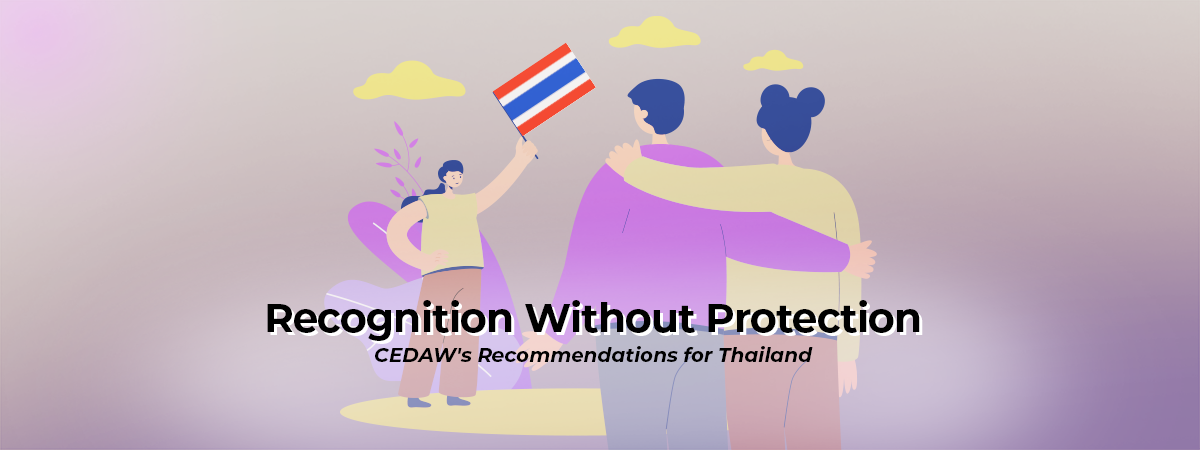In a landmark moment for the intersex community in Thailand and across Asia, the UN Committee on the Elimination of Discrimination against Women (CEDAW) has included the term “intersex” in its Concluding Observations for Thailand. This marks a significant step forward in recognizing the unique human rights challenges faced by intersex individuals. However, while we celebrate this historic inclusion, Intersex Asia and Intersex Thailand are also disappointed that the Committee did not incorporate any of the specific, urgent concerns detailed in the comprehensive joint submission by Intersex Thailand and Intersex Asia.
The journey to this moment was paved by powerful advocacy. Intersex Asia and our national partner, Intersex Thailand, collaborated on a detailed report submitted to the CEDAW Committee. This submission presented a detailed analysis of the full spectrum of human rights violations suffered by the Thai intersex community. The report highlighted several critical areas requiring immediate attention:
- Non-Consensual Medical Interventions: The submission brought to light the negative effects of medical procedures, often termed “sex-normalizing” surgeries, performed on intersex infants and children without their personal, prior, and informed consent.
- Lack of Legal Recognition and Identity: Intersex people in Thailand face significant hurdles in obtaining legal recognition that aligns with their identity. The report detailed the difficulties in amending birth certificates and other official documents, which often force individuals into a binary sex classification that does not reflect their reality.
- Widespread Discrimination and Stigma: The submission underscored the pervasive discrimination faced by intersex individuals in crucial sectors of society. This includes a lack of access to appropriate and non-discriminatory healthcare, exclusion and bullying within the education system, and significant barriers to employment.
- The Urgent Need for Protective Legislation: A key recommendation of our submission was the enactment of a comprehensive law specifically designed to protect the rights of intersex people. Such legislation is essential to prohibit harmful medical practices, ensure legal recognition, and provide clear legal recourse against discrimination.
Intersex Asia has faced significant challenges this year due to funding cuts, which have impacted our ability to support the physical participation of intersex activists at crucial international advocacy events like the treaty body sessions in Geneva. Consequently, we were unable to support a representative from Intersex Thailand to attend the pre-session meetings. Nevertheless, the powerful voice of the community was not silenced. Nada Chaiyajit, the co-founder of Intersex Thailand, delivered a compelling video statement before the CEDAW Committee members, ensuring that the lived realities of intersex Thais were part of the review process.
The absence of specific recommendations on intersex issues in the final Concluding Observations underscores the importance of in-person advocacy. While remote participation is a possible tool, the ability to engage directly with Committee members, to answer their questions, and to provide nuanced, real-time clarification is often what turns a submission into a concrete recommendation.
Despite this, there is a clear path forward. We urge the Thai government to look beyond the general mention of “intersex” and to consider the detailed recommendations provided in our joint report seriously. The ongoing advocacy led by Intersex Thailand for a comprehensive law on intersex rights provides a clear and actionable roadmap for the government to follow. This is a critical opportunity for Thailand to become a regional leader in protecting the human rights of this vulnerable population.
Intersex Asia is grateful to Nada Chaiyajit and the entire team at Intersex Thailand for their tireless work and successful collaboration. While the outcome was not everything we had hoped for, this first step is a significant victory. It has laid the groundwork for future progress and has put intersex rights firmly on the human rights agenda in Thailand. Intersex Asia remains steadfast in its commitment to supporting the vital work of Intersex Thailand as they continue their advocacy.




